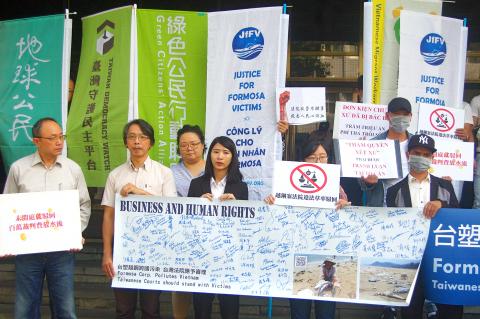A representative for nearly 8,000 Vietnamese fishers suing Formosa Plastics Group (FPG) for marine pollution yesterday said they would fight a Taipei District Court decision to dismiss the case.
Vietnamese-Australian priest Peter Nguyen, who is representing the Vietnamese fishers, told a news conference in Taipei that the district court had accepted NT$1.2 million (US$39,234) in payment for the case, but on Wednesday dismissed the suit on grounds that it had no jurisdiction over it.
While FPG had settled with the Vietnamese government over the 2016 pollution incident involving its member, Formosa Ha Tinh Steel Corp, the fishers whose livelihoods were the most affected had not received any money, Nguyen said.

Photo: Liu Li-jen, Taipei Times
The conglomerate paid the Vietnamese government US$500 million after admitting that its dumping of toxic waste into the sea caused ecological damage to 250km of the Vietnamese coastline.
After efforts to take the group to court in Vietnam met with government intervention, the fishers brought their case to Taiwan , hoping to receive justice, Nguyen said.
Nguyen is currently working at the Vietnamese Migrant and Immigrant Office, which he founded, in Taoyuan’s Bade District (八德).
The office is under the jurisdiction of the Roman Catholic Diocese of Hsinchu County.
Many had helped the plaintiffs raise the money for the case to be heard and processed by the Taipei District Court, which they considered their last recourse for justice, Nguyen said.
The court’s dismissal of the case, citing lack of jurisdiction, has shattered that hope, he said, but added that he hoped the court would reconsider and uphold humanitarian values and Taiwan’s reputation of abiding by the rule of law.
The case has drawn significant international attention and the court’s decision is severely flawed, as it did not even consider the claims of both parties before dismissing the case, Environmental Jurists Association chairmann Chang Yu-yin (張譽尹) said.
The 40th annual congress of the International Federation for Human Rights, which is being held in Taipei from Monday to today, has supported the appeal, Chang said.
As Formosa Ha Tinh Steel is a member of the conglomerate, the lawsuit does concern Taiwan, Environmental Rights Foundation lawyer Huang Hsin-wen (黃馨雯) said..
The decision to dismiss the case without having heard the claims of both parties contravenes the spirit of the adversarial system, which, under Taiwanese law, is the go-to system for civil cases that are not under exclusive jurisdiction, Huang said.
Taiwanese courts are judicially obligated to accept the case, as a Taiwanese company had polluted the environment in a foreign country, foundation chairman Lin San-chia (林三加) said.
The plaintiff’s choice to believe in the Taiwanese judiciary should be respected, Lin said.
The 2016 pollution incident was a classic case of corporate oversight of human rights, Taiwan Association for Human Rights member Yu Yi-chia (余宜家) said.
The UN has stated that nations must take necessary steps to prevent international corporations from violating the human rights of residents in the foreign nation which they have invested, Covenants Watch convener Huang Song-lih (黃嵩立) said.

Nipah virus infection is to be officially listed as a category 5 notifiable infectious disease in Taiwan in March, while clinical treatment guidelines are being formulated, the Centers for Disease Control (CDC) said yesterday. With Nipah infections being reported in other countries and considering its relatively high fatality rate, the centers on Jan. 16 announced that it would be listed as a notifiable infectious disease to bolster the nation’s systematic early warning system and increase public awareness, the CDC said. Bangladesh reported four fatal cases last year in separate districts, with three linked to raw date palm sap consumption, CDC Epidemic Intelligence

Two Taiwanese prosecutors were questioned by Chinese security personnel at their hotel during a trip to China’s Henan Province this month, the Mainland Affairs Council (MAC) said yesterday. The officers had personal information on the prosecutors, including “when they were assigned to their posts, their work locations and job titles,” MAC Deputy Minister and spokesman Liang Wen-chieh (梁文傑) said. On top of asking about their agencies and positions, the officers also questioned the prosecutors about the Cross-Strait Joint Crime-Fighting and Judicial Mutual Assistance Agreement, a pact that serves as the framework for Taiwan-China cooperation on combating crime and providing judicial assistance, Liang

Reports of Taiwanese going missing, being detained or interrogated, or having their personal liberties restricted in China increased about fourfold annually last year, the Mainland Affairs Council (MAC) said yesterday. Last year, 221 Taiwanese who traveled to China were reported missing, were detained and interrogated, or otherwise had their personal freedom restricted, up from 55 the previous year, the council said. Reopening group tours to China would be risky, as it would leave travelers with no way to seek help through official channels after Beijing shut down dialogue between the associations tasked with handling cross-strait tourism, the MAC said. Taipei’s Taiwan Strait Tourism

SHIFT: Taiwan is evolving from a transit stop into a tourist destination, with more international travelers willing to spend on tours, dining and cultural activities Taiwan rose three places in the World Tourism Barometer to 36th globally in 2024, with international tourism revenue of US$10.028 billion, the Tourism Administration said on Monday. The UN Tourism Organization publication said that its focus has switched from whether a country has returned to pre-COVID-19 levels of tourism to the amount spent by a tourist during an overseas trip. The nation last year welcomed 8.57 million international tourists, about 9 percent more than in 2024, with most tourists coming from Japan, South Korea, and Hong Kong and Macau, all of which accounted for at least 1 million tourists each. During the first